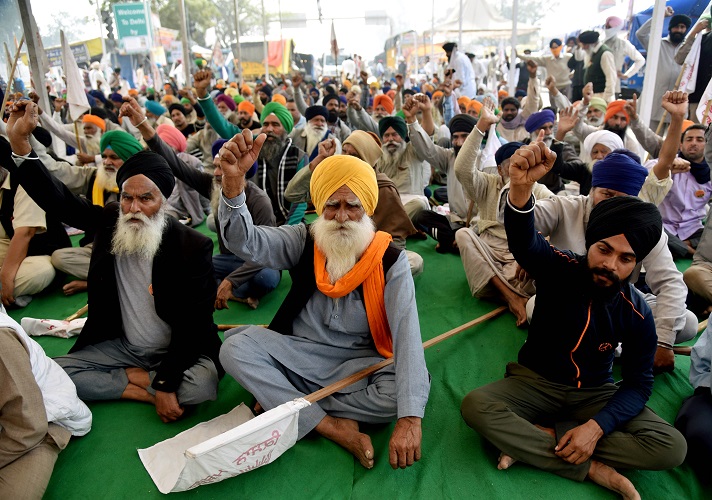In an obvious attempt to smoothen the chances of the Bharatiya Janata Party in the forthcoming Assembly elections, particularly in Punjab and Uttar Pradesh, Prime Minister Narendra Modi took everyone by surprise by declaring that his government would be repealing the contentious farm laws.
However, the nullification of these laws can only be done through Parliament and a large number of farmers are of the view that unless this procedure was initiated and completed in the Winter Session, it would not be possible to implement PM Modi’s announcement.
Therefore, the full impact of this intent on the Assembly polls can be accurately gauged only if things actually change on the ground. Over the past one year and ever since the agitation started on the Delhi borders, there has been total distrust that has come about, and this feeling cannot be wished away overnight. It shall take some time for the proclamation to sink in and it would be in fitness of the spirit of this objective that the issue should not be viewed prematurely.
However, this volte face by the government implies that it would not be easy for the ruling dispensation to explain why these laws were enacted in the first place. Ministers and functionaries of the BJP have in the past tried to project the peasants as “Khalistanis” and “anti-nationals”, and it would be interesting to see how their description would change.
Equally difficult would be the task of TV anchors in particular, who have in the past year defended the legislation, describing it as beneficial to the overall interests of the farmers. Now they shall have the task of providing a different perspective which would show the withdrawal in a more positive light. There is certainly going to be egg on many faces.
The main lesson that needs to be learnt from this adventurous legislation is that nothing should be passed in Parliament without wider consultation including that with the stakeholders. No law can succeed if it alienates those it is supposed to facilitate. The threat by farmers to gherao Parliament must have also played on mind of the government besides the Assembly polls.
The fallout of the enactment was that the BJP in particular had to bear the brunt in Punjab, Haryana and western Uttar Pradesh. Senior leaders could not visit their constituencies or their villages and many activists took off the party flag from their vehicles and from the top of their houses. In western UP, the BJP had benefited by polarising the Hindu votes but the farm laws brought the Hindus and Muslims together, thus creating problems for the party.
In all, the above-mentioned regions witnessed a huge social unrest which was likely to transform into a political unrest as well. The violence unleashed on the farmers in Lakhimpuri Kheri in the latest instance resulted in world-wide condemnation. It was being said that when the poll process begins in UP, the BJP would begin its campaign with a handicap of 92 seats which fall in the western belt of the country’s most populous state. Obviously, the ramifications would have been extremely serious.
What is going to become very difficult for the BJP and the government to explain is why 700 farmers had to die after they braved severe cold, intense heat and cruel conditions. Also, this did not deter their brothers from abandoning the agitation. Obviously, some sort of accountability would be sought and politics is not going to necessarily make the dice fall in favour of the saffron brigade and its allies.
There was only Feroze Varun Gandhi, Indira Gandhi’s grandson, who was the sole voice who continued to speak in favour of the farmers despite being a BJP MP. Governor Satya Pal Mailk was also another leader close to the BJP who was critical of the enactment and supported the demand for the repeal openly.
However, it is also not going to be necessarily true that the farmers would vote in favour of the Congress in Punjab and for some other Opposition party in Uttar Pradesh keeping in mind the fragility of politics. In fact, it is difficult to assess the situation at this early stage and a more realistic opinion would only emerge once the repeal is done and dusted.
Former Punjab Chief Minister, Captain Amarinder Singh was amongst the first to welcome the Prime Minister’s declaration and said that his party would be open to tying up with the BJP. However, it would be interesting to see whether the BJP would be also equally eager for this understanding, since the state party chief had recently stated at the meeting of the National Executive that they would be contesting on all the 117 seats.
Another significant aspect of the agitation is that amongst the reasons why the government did not crack down on the farmers was the large scale support the protest received from the Sikhs. Any kind of harsh action on the farmers could have snowballed into a prolonged crisis in Punjab, for which no one would have been interested, given the volatile situation that exists in Afghanistan and Kashmir.
The government had apparently tried every method of making the kisans withdraw their prolonged protests but in the end, the Prime Minister, who is highly political in his approach, realised that the repercussions would be monumental. His action needs to be lauded since he has at least conceded the truth. This is essentially a victory of the people. Between us.
Politics of untwining farm laws
- Advertisement -

